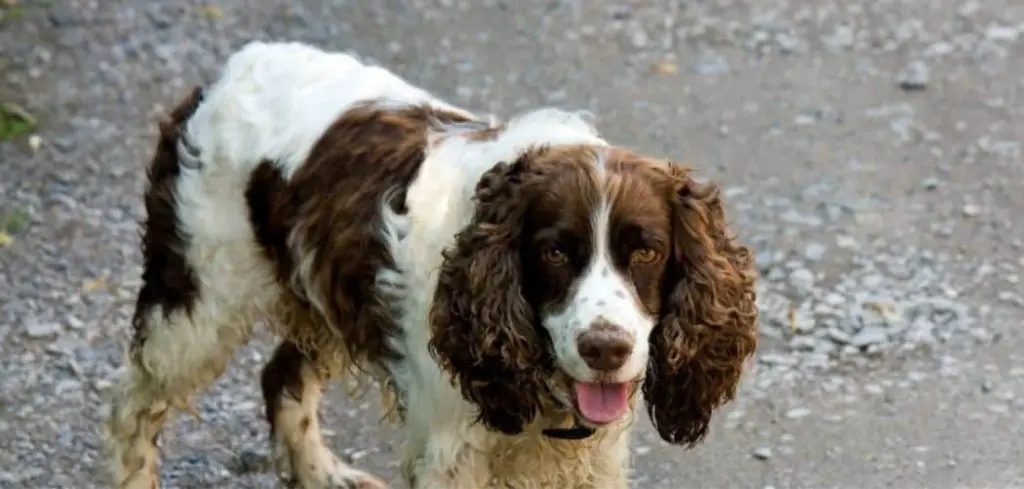If your dog is lethargic and not eating and licking lips repeatedly, it could be a subtle but important sign of underlying discomfort or illness.
Lip licking in dogs is often associated with nausea, oral pain, or anxiety—but when it’s paired with low energy and refusal to eat, it becomes more concerning.
We outline what these combined symptoms could mean, the possible causes behind them, and how you should respond.
Dog Lethargic and Not Eating and Licking Lips: Why It Happens
When your dog is lethargic and not eating and licking lips, it could be due to nausea, oral discomfort, gastrointestinal issues, stress, liver problems, or toxin exposure. These symptoms often signal that something is physically or emotionally upsetting your dog.

Dog Lethargic and Not Eating and Licking Lips: Common Causes
Nausea or Upset Stomach
One of the most common reasons dogs lick their lips—especially when they’re also lethargic and not eating—is nausea.
This might be from something they ate, motion sickness, or a deeper gastrointestinal problem.
Watch for:
Drooling
Gulping or swallowing frequently
Eating grass
Vomiting or dry heaving
Nausea reduces appetite and makes dogs act sluggish. If it lasts more than 24 hours or is accompanied by vomiting, call your vet.
Gastrointestinal Issues
Inflammation of the stomach (gastritis) or pancreas (pancreatitis) can cause nausea, lip licking, and fatigue.
These conditions may be triggered by dietary indiscretion (eating trash, greasy food), certain medications, or underlying health conditions.
Other symptoms might include:
Abdominal pain (dog may stretch or hunch)
Vomiting or diarrhea
Dehydration
Restlessness followed by lethargy
Pancreatitis is serious and often requires veterinary care, including fluids, pain management, and dietary changes.
Related: My dog is lethargic and not eating (Causes and when to worry)
Oral Pain or Dental Problems
If your dog is licking their lips and avoiding food, they may be dealing with a sore mouth, broken tooth, or gum infection. Oral pain can cause:
Drooling
Pawing at the face
Bad breath
Bleeding from the mouth
Older dogs are especially prone to dental disease. A vet exam and professional dental cleaning may be necessary.
Liver Disease
Liver issues can cause nausea, lethargy, and odd behaviors like lip licking.
Toxins that the liver normally filters out may accumulate, affecting your dog’s appetite, energy, and digestion.
Other signs of liver trouble:
Yellowish gums or eyes (jaundice)
Vomiting
Confusion or wobbliness (in severe cases)
Bloodwork is required to evaluate liver function. Early detection is key for managing liver-related problems.
Anxiety or Stress
Lip licking is also a common calming signal dogs use when they feel anxious or overwhelmed.
If your dog recently experienced something stressful—like a grooming appointment, vet visit, or being left alone—they may show signs of emotional discomfort.
Look for:
Trembling
Pacing or hiding
Whining or clinginess
Tucked tail
While mild anxiety usually passes with time, persistent behavior changes should be evaluated for deeper medical causes or treated with behavior modification or medication.
Toxin Exposure
If your dog licked or ingested something toxic, they might show early signs like lip licking, nausea, and sluggishness. Common toxins include:
Chocolate
Artificial sweeteners (xylitol)
Grapes or raisins
Cleaning products or human meds
Call your vet or a pet poison hotline immediately if you suspect poisoning. Early intervention is critical.
Foreign Object in the Mouth or Throat
Something stuck in your dog’s teeth, gums, or throat can cause repeated lip licking and refusal to eat. Dogs may also gag, cough, or paw at their mouth.
Inspect your dog’s mouth carefully—if safe to do so—or ask your vet to perform a full oral exam.
What to Do If Your Dog Is Lethargic, Not Eating, and Licking Lips
If your dog is showing these symptoms, try the following steps:
Keep your dog calm and comfortable – Reduce stimulation and give them space to rest.
Offer bland food – Plain boiled chicken or rice may entice them to eat if nausea is mild.
Check for mouth injuries or swelling – Gently lift the lips to look for signs of pain or damage.
Watch for worsening symptoms – Such as vomiting, diarrhea, or disorientation.
Avoid giving medications unless prescribed – Human meds can worsen symptoms or cause toxicity.
Mild nausea or anxiety might improve on its own, but if symptoms persist, consult your veterinarian.
When to Call or Visit Your Vet
Call your vet if:
Lip licking continues for more than 24 hours
Your dog refuses food entirely or shows signs of vomiting
There’s visible oral injury or dental swelling
Lethargy is severe or sudden
You suspect toxin ingestion
Your vet may perform a physical exam, bloodwork, or imaging to uncover the root cause and begin treatment.
Related: My dog is drooling and lethargic (Here’s why)
Key Takeaway
If your dog is lethargic and not eating and licking lips, they may be trying to cope with nausea, oral discomfort, or deeper health issues.
While some causes are minor and pass quickly, others can be serious and require medical care.
Always trust your instincts—if your dog seems “off” and these symptoms persist, don’t wait to get them checked.
With timely support and veterinary guidance, your furry friend can get back to wagging and eating happily again.
